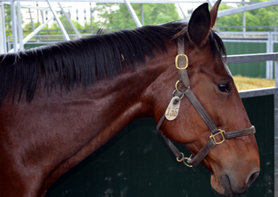THREE HORSES CONTRACT EASTERN EQUINE ENCEPHALITIS
First Reported Cases of 2014
For Immediate Release: September 25, 2014
Contact: Lynne Richmond
(609) 633-2954
lynne.richmond@ag.state.nj.us
(TRENTON) – Three horses from Burlington, Gloucester and Ocean counties are the first reported cases in 2014 of Eastern Equine Encephalitis (EEE), a serious, mosquito-borne illness in horses.
The 4-year-old mare from Gloucester County began showing neurologic signs of EEE on August 10 and was humanely euthanized on September 10. A 2-year-old Ocean County mare began showing neurologic symptoms on September 11 and died on September 14. The Ocean County horse had been vaccinated for EEE in the spring. The 6-year-old Burlington County gelding was not vaccinated and began showing signs of illness on September 21 and was euthanized that day.
“Horse owners need to be vigilant in vaccinating their animals against diseases spread by mosquitoes,” said New Jersey Secretary of Agriculture Douglas H. Fisher. “Vaccinated animals are much less likely to contract deadly diseases such as EEE and West Nile Virus.”
EEE causes inflammation of the brain tissue and has a significantly higher risk of death in horses than West Nile Virus infection. West Nile virus is a viral disease that affects horses’ neurological systems. The disease is transmitted by mosquito bite. The virus cycles between birds and mosquitoes with horses and humans being incidental hosts. EEE infections in horses are not a significant risk factor for human infection because horses (like humans) are considered to be "dead-end" hosts for the virus.
In 2013, New Jersey had two cases of EEE in August. No cases of West Nile Virus (WNV) were reported last year.
Effective equine vaccines for EEE and WNV are available commercially. Horse owners should contact their veterinarians if their horses are not already up-to-date on their vaccinations against both EEE and WNV.
For more information about EEE in horses, visit www.cfsph.iastate.edu/FastFacts/pdfs/easter_wester_venezuelan_equine_encephalomyelitis_F.pdf.
EEE and West Nile virus, like other viral diseases affecting horses’ neurological systems, must be reported to the state veterinarian at 609-671-6400 within 48 hours of diagnosis. The New Jersey Animal Health Diagnostic Laboratory is available to assist with EEE and WNV testing and can be reached at 609-671-6999.



